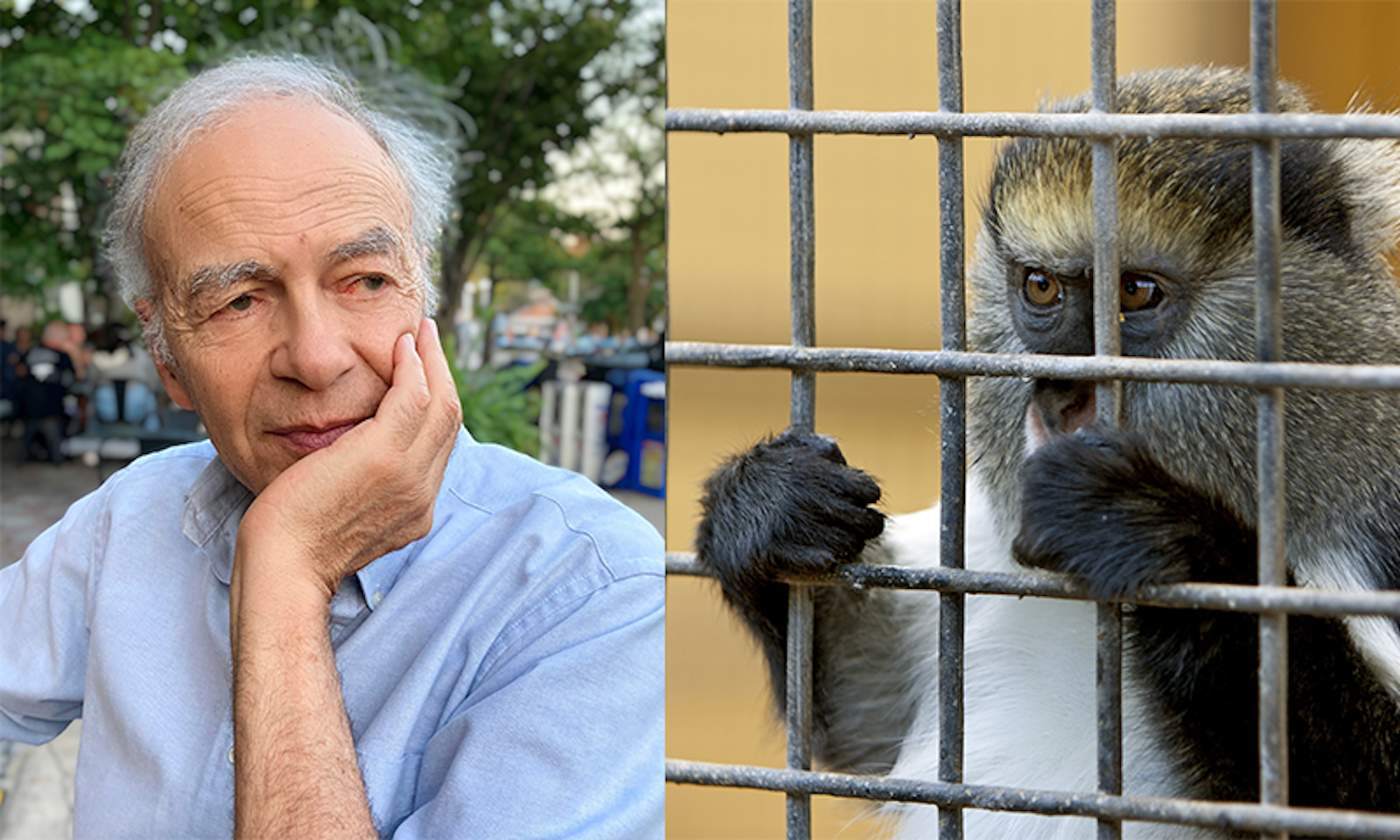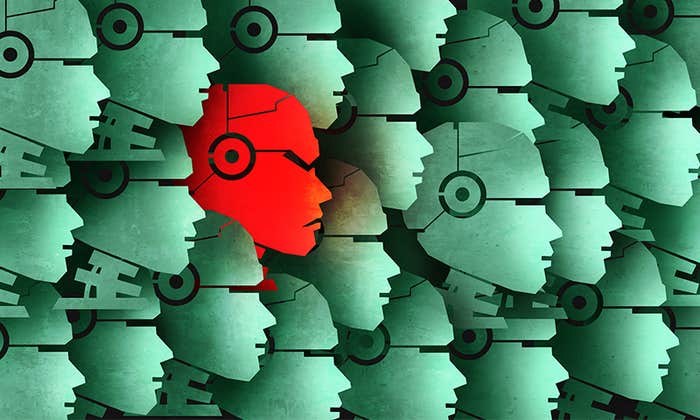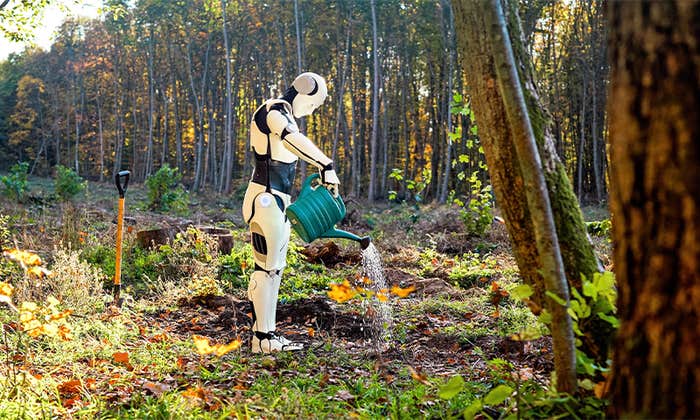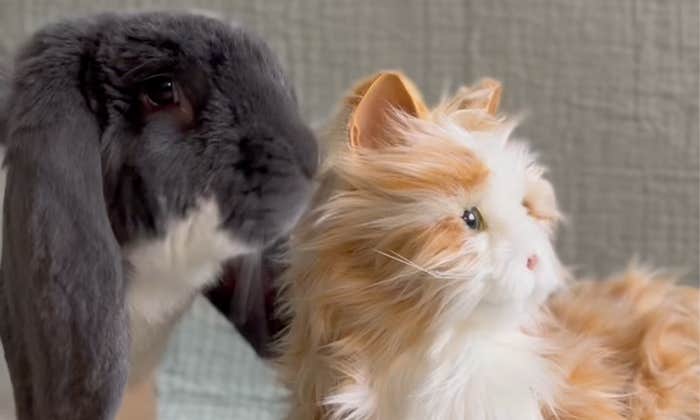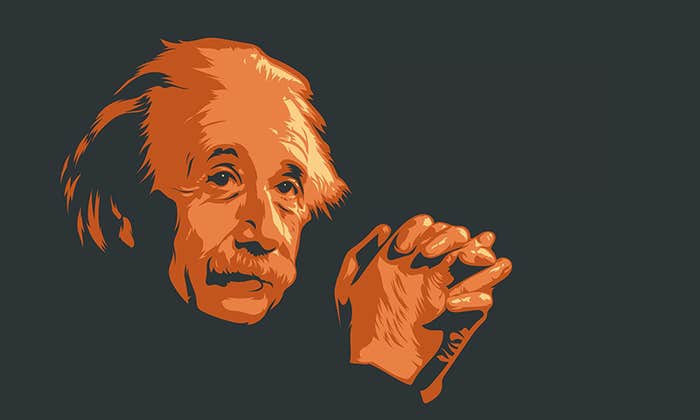In 1970, a graduate philosophy student named Peter Singer happened to meet a fellow student who didn’t eat meat. Even today this is uncommon, but at the time it was radical, and it made Singer pause. “Here I’d been eating meat for 24 years. I was studying ethics. Yet I’d never thought that eating meat might be an ethical problem,” he recalls. “I thought, what does entitle us to treat animals like this? Why is the boundary of our species so important?”
Out of the intellectual journey that followed came Animal Liberation, published in 1975 and considered one of the most influential books in modern history. Encyclopedia Britannica called Singer “one of the world’s most widely recognized public intellectuals,” and he and his seminal work are credited with shaping the modern animal rights movement.
Maybe caterpillars suffer, but do they suffer like us?
Now a professor of bioethics at Princeton University, Singer is quick to clarify that his arguments are not fundamentally about rights. Rather, they’re about equality: The interests of similar beings deserve similar moral consideration, regardless of the species they belong to, and avoiding pain is a transcendent interest. “If a being suffers, there can be no moral justification for refusing to take that suffering into consideration,” he writes. “Beings who are similar in all relevant respects have a similar right to life; and mere membership in our own species is not a morally relevant distinction.”
That message is even more timely—and more challenging—now than when Singer first delivered it. It’s estimated that there are more than 33 billion domesticated chickens, mostly in factory farms, as well as 1 billion pigs and 1.5 billion cows. More than 100 million animals live in laboratories. The scale of their suffering is so vast as to be almost inconceivable. At the same time, however, there is more support than ever before for improving animal welfare and respecting animal rights. And although science has provided new ways of exploiting animals, it has also illuminated their lives and deepened our empathy.
In anticipation of Animal Liberation Now, the newly published update to his classic text, Singer talked to Nautilus about science, ethics, and the future of animals.

A half-century ago, when you wrote Animal Liberation, the claim that animals other than ourselves had subjective experiences was scientifically very controversial. That they experience pain in a manner similar to how we do was not recognized in a great many creatures.
How did you think about the science at the time? Were you aware that, in a sense, you were getting out ahead of where the science was?
When I started thinking about this issue, there was still a kind of behaviorism in science and in psychology particularly. You were not supposed to talk about the subjective feelings of animals. You were supposed to observe their behavior. You were supposed to say that when you gave a dog an electric shock, it vocalized and showed a diversity of behavior. You were not supposed to say the dog was in pain.
But there were also pioneers in understanding animal behavior much better. Perhaps the first I read was Tinbergen’s study of seagulls, which clearly treated them in a different way. Donald Griffin’s The Question of Animal Awareness came out after I’d started working on this, and that was a breakthrough book in talking about animals actually being aware.
The other thing I felt supported by was that even if behaviorists and some scientists talked this way, nobody did who wasn’t in that field. Nobody said when their dog hurt himself that he was showing aversive behavior. Nobody denied that their dog felt things and was happy to go for a walk. Everybody knew that animals do have these emotions and subjective awareness. That encouraged me to think from the start that there was just something wrong with the behaviorist view.
I think about that gap between everyday knowledge and scientific knowledge a lot. It continues today: In everyday, common-sense ways we impute a great deal of intelligence and subjectivity to animals that isn’t yet supported by the science. And I cannot think of another subject in which there’s such a gap between what most people would intuitively say is true and where the science is. Are there analogues that come to your mind?
That’s an interesting question. Philosophers would say there are gaps in our beliefs about free will or responsibility for actions. Some neuroscientists might also think that. But I think that’s a lot more nuanced than what you’re talking about with regard to animals.
But you don’t think that gap has been closed? I feel that since the 1960s and 1970s that gap has closed quite a long way.
Absolutely I think so, which actually brings me to my next question. Since Animal Liberation’s publication, and especially in the last couple decades, is there research that’s been especially compelling to you?
Quite a lot. Along with Tinbergen, I should have mentioned Jane Goodall. And then there were people like Dian Fossey and Biruté Mary Galdikas working on gorillas and orangutans. Their work has been really important. Another woman, and more related to the issues I write about, is Marian Stamp Dawkins. She was interested in how you measure what farmed animals really want.
She did the first studies showing that if you give laying hens the experience of a wire cage and the experience of a grass run, and then you set up a system where if they peck for a long time at a button they’ll be released from the cage, they’ll work quite hard to get to the grass run—whereas they never work to get from the grass run to the cage. That was quite scientific, and it was really showing that hens have preferences for where they want to be and how they want to live.
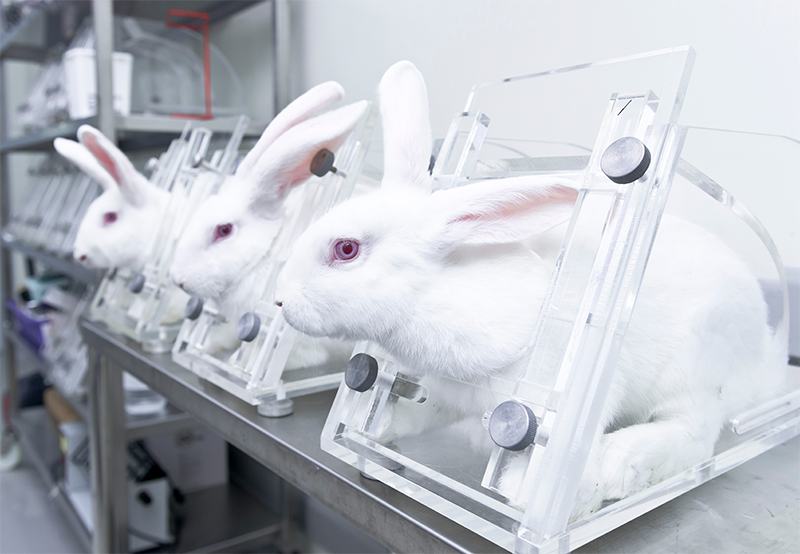
WIDE-EYED: New Zealand White rabbits are cheap, easy to handle, and have very large eyes, all of which makes them popular test subjects for studying the effects of chemicals on eyes and skin. Photo by unoL / Shutterstock.
Yet to quote from Yuval Harari’s foreword to Animal Liberation Now, “The scientific study of animals has so far played a dismal role in this tragedy.” Science isn’t always used to understand animals; it’s also used to serve our own purposes for them.
It was interesting that the chapter on medical research came before the chapter on factory farming. Is there a reason you put the medical science first?
Let me say first: It’s not all medical science. I think that’s a bit of a myth—that all the experiments we do on animals have medical purposes. There’s a lot that is not really medical at all.
I put it ahead of the chapter on factory farming because it relies on the idea that animals are like us in important ways. Now, you could say, “Well, that’s just because they have, say, kidneys, so we can study kidney disease in animals—but the similarity ends with anatomy. It doesn’t extend to experience.” And I suppose you could have a being with kidneys that had barely any consciousness, though I don’t think that’s in fact the case.
But when you get to experiments in psychology, that argument doesn’t work. That’s why I talked about Harry Harlow’s experiments on maternal deprivation. He was trying to study depression and the effect of isolation on human children. If you think doing that to monkeys is going to tell us something about what happens to humans, you have to say that monkeys are suffering much the way humans are. I wanted to make that point up front before getting to the farming issue.
I was familiar with Harlow’s work and some of the research you describe on animal “models” of human psychological trauma and PTSD, but I was taken aback at just how horrific and decades-spanning in scope is. I also wondered if maybe you were cherry-picking the argument, so I did some digging into the research—and it’s striking how even contemporary reviews acknowledge that this research has gone on for decades without producing much human benefit at all.
But what about research where there’s a stronger argument to be made about the human value? Cancer comes to mind. Treatments have come a long way in the last couple decades. Or vaccines for COVID-19: One can quibble about how much later-stage animal experimentation was necessary, but for the technical backbone of the mRNA vaccines, those insights came from experiments on animals.
That’s a fair question. And I do talk about that in connection with Parkinson’s disease research. I’m not an expert in that area, but if the facts as told to me by someone who is an expert are correct, I think we can defend the use of a small number of animals to find ways of relieving the symptoms of people suffering from that condition.
Nobody denied that their dog felt things and was happy to go for a walk.
In general I don’t think it’s sound to take an absolutist stance and say animal experimentation is always wrong. Your example of COVID vaccines is possibly another good example. If there is a prospect for something of great value like that, and which will take a limited number of animals, and if the animals are cared for and treated in ways that minimize their suffering to the greatest extent possible, that can be compatible with the idea of equal consideration of interests. Because there’s a very large number of very vital interests to live better with Parkinson’s or develop vaccines to save millions of lives.
Then we can say we’re sacrificing the interest of some beings—while taking care to make that sacrifice as limited as possible—for a greater benefit. But what’s important, I think, is that we’re not simply saying: The benefit is to humans and the cost is to mice, so therefore it’s fine.
Many scientists would say that it would be wonderful if we could only experiment on a few animals, with a high potential for significant insight—but not much research is actually like that. Advances in alleviating human suffering or treating disease are built from many small pieces of research, and they were undertaken without much hope of success or even an idea of what they would be applied to.
I’m not sure that argument is always true, but sometimes it is. How do you deal with that?
I don’t think there’s any easy answer to that question. But there is a counterfactual here. What if we had put the resources we put into animal experimentation—most of which we don’t really learn anything important from, but now and again something turns up that’s really important—into other methods of advancing biological and medical science? It’s hard to know what we would have discovered.
A much less nuanced topic is the farming of animals. And there is this paradox that we’re more aware now than at any other time in modern history of animals’ capacity to suffer—yet the suffering continues on an inconceivably vast scale. What do you do with that? What does it say about us?
I think it does say something bad about us. Not that we’re sadistic or anything evil like that, but that we’re highly biased when it comes to our own interests, and we see our interest as continuing to consume these animals. To some extent that’s just habit, I suppose, and maybe to some extent it’s a kind of evolutionarily-programmed taste for high-nutrient-density food. That really blinds us to what we’re doing.
I don’t think that most people are indifferent to animal suffering. They react to it when they see it—but they don’t want to see it if it’s going to interfere with their dinner. So I think that’s the ultimate problem.
Things are changing in some parts of the world more than others. I think there’s more awareness of these issues, and more willingness to change, in Europe than in most of the United States. Although I do think the problems in the U.S. are maybe not so much the attitudes of individual Americans but the corruption of the political system, where the agribusiness lobby plays such a huge part and money plays such a huge part. But once people know what’s going on, they will vote against it. Like the Massachusetts vote on giving farmed animals room to move around and stretch their limbs and wings: That had 78 percent support. That’s pretty incredible in polarized America for almost anything.

I think most people have a sense that farmed animals experience pain and can suffer, but believe the quality of that pain and suffering does not approach what humans feel. And the science is not especially illuminating on this issue. Science can say, of course chickens feel pain or pigs can be depressed—but does it compare to ours? That’s my gut feeling, but that’s not where the science is.
I think you’re essentially right. It’s not something that science can shed a lot of light on. Science can show some things: that the same neurological mechanisms work in animals as in us, that their behavior changes in ways somewhat similar to our own. It can show that giving analgesics reduces behavior that indicates pain. But comparing mental states is a philosophical problem.
I don’t know that I feel pain as much as you. I talk about this with my wife sometimes, because she doesn’t mind going to the dentist in the way that I do. Does that mean I’m more cowardly? Or that my nerves are more sensitive than hers? And if I don’t know that between myself and my wife, how am I going to know it between myself and a pig or a chicken?
But the thing is: What’s the basis for assuming their suffering is less? With some kinds of mental suffering, like anxiety about your future, maybe you need cognitive capacities that the animals we eat don’t have. The perception of pain, though, is essential for relating to one’s environment and avoiding danger. And we know that many animals have senses that are much more acute than ours, right? We know birds of prey have sharper vision than we do. We know that dogs have sharper smell than we do. Why assume they don’t feel pain as we do?
You said earlier that people are not cold-hearted toward animals. If anything, it’s the opposite: With any individual animal we meet, most people will be affectionate and respond with care if they’re in distress. Yet the moment that animal is locked away, cut into pieces and put on a plate, it’s a completely different being. We might as well be looking at a stone.
Have you come across any research from the social or behavioral sciences that helps explain this?
There’s two pieces of social psychology research that I think are relevant here. One is that with humans we also focus on individuals, not masses.
Paul Slovic has done a lot of research on that. In one study he brought students in for an experiment and didn’t tell them what it really was, but said they’d be paid $15 for doing it. He gave them some questions to answer that had nothing to do with the experiment. When they finished, they were paid and given a presentation about how the lab was supporting a charity. Then they were given a notice that said something about how thousands of children go to bed hungry every night in Malawi, and you can help them by donating—or it had a picture of a girl and said, “This is Rokia. She’s 7 years old. She doesn’t get enough to eat. You can help her.” The students who got the information about a single child donated much more than students who got information about thousands of children.
The other research was done by an Australian psychologist named Brock Bastian. He asked people about domestic animals—cows and pigs and chickens—and what they thought of their mental capacities. Then he got them to do other things that had nothing to do with animals. When lunchtime came, he told some participants that they would get a beef hamburger for lunch and others that they would receive a plant-based lunch. After that came further questions about animal capacities. Those people who were told they’d be having a hamburger had lower opinions of the cows’ mental capacities than people told they would have a plant-based meal.
I think that’s pretty good evidence that knowing what we’re eating biases our assessments.
Previously you’ve drawn the line for who you felt comfortable eating somewhere between shrimp and oysters. Is that still where the line is?
That’s still pretty close. I think it’s unlikely that oysters feel pain. And even if you think they do, then because of the way they’re grown and harvested it might well be that you’re not responsible for more pain than if you eat plants. Because after all plants also have to be grown and often rodents are killed while plowing or harvesting. We can’t be 100 percent pure, and I think eating oysters is as pure as most foods we can get.
But some people have tried to persuade me that not all bivalves are alike. I had talked about oysters, and then said this will also go for mussels and scallops and clams. They suggested that while oysters do remain fixed on a rock and it’s hard to see why they would have evolved the capacity to feel pain, scallops can propel themselves and have some kind of vision. So maybe I should have said the line is between a scallop and an oyster rather than between a shrimp and an oyster. I’m not sure. It’s somewhere around that vicinity, anyways.

What do you make of new research on cognition in plants? Does that change the ethical equation of consuming them at all?
I don’t think so. Partly because I think we are justified in surviving, and if eating plants is necessary for us to survive, then that justifies it. And partly because if you eat animals, the animals have themselves eaten a much larger number of plants than if we ate the plants directly. So if plants are sentient beings, we would still do them less harm by eating them directly than by eating animals who eat them.
As for my own views about the possibility that plants are sentient, I’d say the new research maybe slightly reduces my confidence that they’re not. I was completely confident about that before; now I’m maybe 98 percent confident. The research is quite ambivalent. I don’t think anything really shows that plants are sentient beings, but it does show their behavior is complicated. The question is: How do you explain it? We may still explain it in ways that have nothing to do with consciousness. That still seems most likely.
In Animal Liberation you touch a bit on the suffering and experiences of wild animals. This overlaps with the subject of my own book, and I’ve found myself reflecting on critiques from welfare biologist philosophers who see the lives of wild animals as being dominated by suffering. That’s a distressing thought for me.
It’s springtime now, and it’s wonderful to go on a walk in the morning and be surrounded by all this stirring life. I don’t want to think that I’m actually just putting on my rose-tinted glasses and what I think of as a beautiful morning is soaked in pain and suffering. But maybe I’m just a romantic. How do you look at the subjective experiences of wild animals?
I’m not as pessimistic as some are. And having talked to some of the people involved—Oscar Horta and Catia Faria and so on—I don’t think that, when you’re walking through the woods and listening to the birds, they’re seeing that as negative in itself. What they’re looking at is those animals who produce very large numbers of offspring, the overwhelming majority of whom don’t make it. And the assumption is that they die in painful ways.
It partly depends on whether we think that insects are sentient beings. I’ve had this thought myself. For example, I had some kale plants, and I was away for a bit, and when I came back butterflies had laid their eggs, and the plants were swarming with caterpillars. It was clear that they were all going to starve to death. That raises the question: If those caterpillars are in pain, if they are suffering, then maybe the wild animal suffering balance is negative. There’s so many of them.
But it’s hard to know. And maybe caterpillars suffer, but do they suffer like us? They have so few neurons. What’s going on? I hope either they don’t suffer or that their suffering is of a different order in some way.
If there was some way of empirically verifying that, say, what caterpillars suffer is 10 percent of what we would in a similar situation, the sheer numbers involved mean that the interests of those caterpillars—and every other insect—would outweigh our own in many circumstances. It would certainly be impossible to justify driving a car for most of the year here.
So if insects have experiences comparable to ours, does that make a complete hash out of your frameworks?
It would make life extremely difficult, I agree. But I don’t think it makes a hash out of the general ethical framework I apply, which is that we want to maximize well-being. The framework still stands.
And are you hopeful for the future? Do you think our circle of moral consideration will continue to expand, or just continue to be the irregular shape that it is now?
I’m hopeful. I do think that’s the long-term trend, just as Martin Luther King, Jr. said: “The arc of the moral universe is long, but it bends toward justice.” It’s going to take some time; there will be peaks and troughs. But I think the long arc bends toward the inclusion of all sentient beings. ![]()
Brandon Keim (Twitter / Instagram / Substack) is a freelance journalist and editor of the Ocean section at Nautilus. He is now finishing Meet the Neighbors, a book about animal personhood and nature, which will be published by W.W. Norton in 2024.
Lead image: Tasnuva Elahi, from a photo of Singer by Katarzyna de Lazari-Radek and She / Shutterstock















